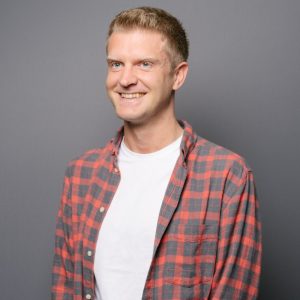Could you tell us about your contribution, James?
My outstanding contribution has been in research and innovation, with a portfolio of internationally excellent research outputs in film and media history. I’ve published two monographs, two edited collections, over thirty journal articles and book chapters, and co-edited three special journal issues. My contribution to film and media history was recognised by the Royal Historical Society, which elected me a fellow in 2022.
My significant contribution has been in teaching and learning. I’ve served as course leader for the BA (Hons) Media degree, served on a variety of committees at college and University level, and been an ECR representative. I’ve been an external examiner and an external assessor at universities across the UK. I’ve also contributed to the development of the doctoral community at Hallam, supervising five PhD students.
What does it mean personally to you to be an associate professor at Hallam?
I value the recognition and the opportunity to work in my home city in a job that I love doing, and to be given the time and space to undertake the research that I want to pursue.
Tell us a bit about your career story so far.
Prior to working as a lecturer in higher education, I worked in quality in further and higher education, including a role as a quality officer at the University of Leicester.
I’ve also worked in documentary script development for the Northern Ireland Screen Agency. However, I wanted to further pursue my interests in media history and archival research – though, not with any intention of becoming a lecturer.
I was awarded a full-time PhD scholarship by De Montfort University and completed a thesis that examined the role of the producer on the films of Stanley Kubrick. My thesis involved a combination of archival research and interviews and I got to know some of Kubrick’s family. It was during my PhD that I realised I wanted to work full-time as a lecturer.
So, following the completion of my PhD, I worked a series of fixed-term contracts at universities across the UK, including at the University of Derby and UWE Bristol. I joined Hallam in 2019 as a senior lecturer, which allowed me to return to my home city of Sheffield.
If you could go back in time and give yourself some career advice, what would it be?
I wouldn’t. I’m not saying my career trajectory has been perfect, or that I knew exactly how to become a lecturer. But all of my experiences have added up to make me who I am now and, I think, a better person and a better lecturer for it.
I’ve still got a lot to learn and so I always seek advice from others whenever I can. I would say that I wish I had known more about the world of higher education, research, PhDs and so on when I was an undergraduate. Even though I was a university student, I had no idea what lecturers did beyond standing in front of me during lectures and seminars. I didn’t even know what a PhD was until many years later. So, that is something I’ve carried forward with me and I always aim to involve and engage my students in everything I and my colleagues do beyond just delivering a lecture or a seminar. I want them to know that being a lecturer, or doing a PhD, is a route that’s open to them as well and isn’t just a profession for those from the most advantaged backgrounds.
What’s next? How do you want to further develop your contribution?
I’ve a third monograph, Archive Histories: An Archaeology of the Stanley Kubrick Archive, forthcoming with Liverpool University Press; three further edited collections forthcoming with Bloomsbury and Intellect; and a special issue of the Journal of Culture and War that I’m co-editing with Professor Sue Vice (University of Sheffield) and Dr Kieran Foster (University of Nottingham) on unmade Holocaust films and television programmes.